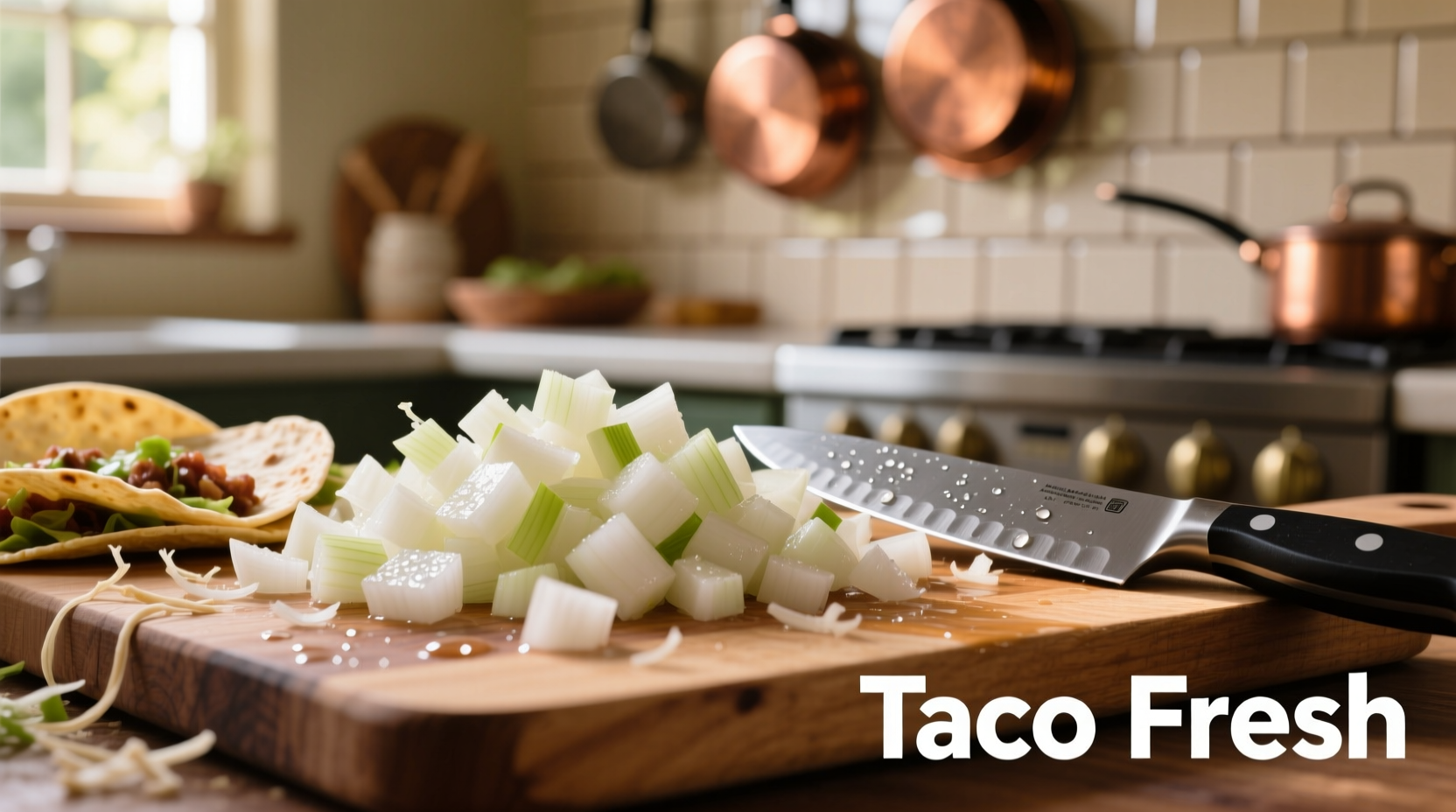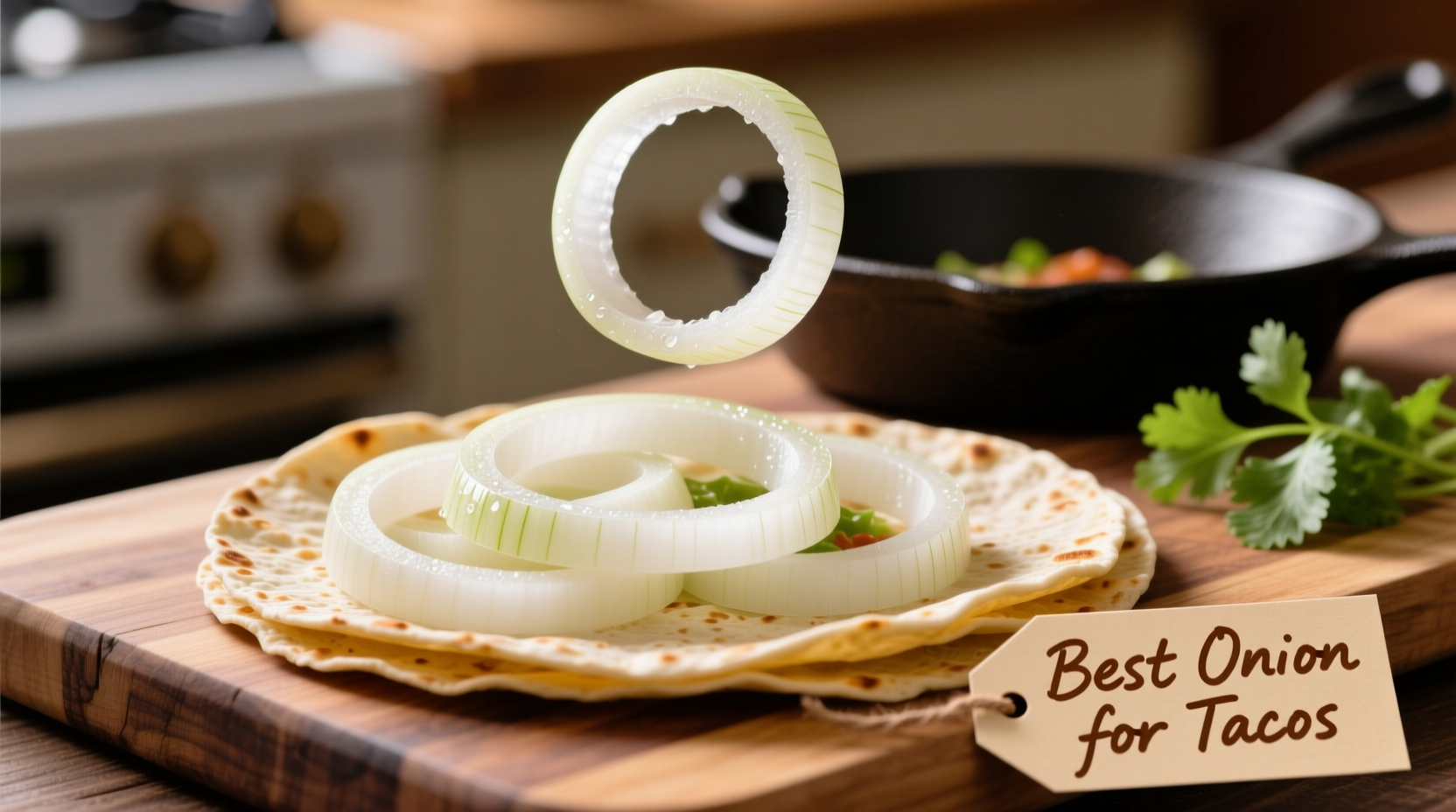When crafting the perfect taco, your onion selection makes or breaks the experience. Many home cooks unknowingly sabotage their tacos with the wrong onion variety, ending up with either overpowering bitterness or bland disappointment. This guide reveals exactly why white onions dominate authentic Mexican taquerías and provides professional techniques to maximize their flavor impact.
Why Onion Selection Matters for Tacos
Onions contribute more than just crunch to tacos—they're flavor conductors that bridge your protein, salsa, and tortilla. The wrong choice creates imbalance: yellow onions bring excessive sweetness that clashes with traditional seasonings, while red onions' strong bite overwhelms delicate fish or vegetarian fillings. White onions' unique sulfur compounds provide that essential "taco snap"—a bright, clean finish that cuts through rich meats like carnitas while enhancing fresh salsas.
Onion Varieties Compared for Taco Applications
| Onion Type | Flavor Profile | Taco Suitability | Best Taco Pairings |
|---|---|---|---|
| White Onion | Sharp, clean, moderately pungent | ★★★★★ (Ideal) | All traditional tacos, especially carne asada and al pastor |
| Red Onion | Bright, slightly sweet, strong aftertaste | ★★★☆☆ (Situational) | Fish tacos, vegetarian options, quick-pickled applications |
| Yellow Onion | Sweet, mellow when cooked, bland raw | ★☆☆☆☆ (Poor) | Caramelized applications only, not recommended raw |
| Sweet Onion | Very mild, high water content | ★★☆☆☆ (Limited) | Specialty applications where extreme mildness needed |
The Science Behind White Onions' Taco Superiority
According to agricultural research from the University of California's Vegetable Research & Information Center, white onions contain higher concentrations of 1-propenyl-L-cysteine sulfoxide—the compound responsible for that distinctive sharp yet clean finish essential in Mexican cuisine. Their lower sugar content (3-5% compared to yellow onions' 8-10%) prevents unwanted caramelization when used raw, maintaining structural integrity that holds up against juicy fillings.
Traditional Mexican taquerías consistently use white onions because they've evolved alongside regional ingredients. The National Institute of Anthropology and History in Mexico documents white onions' presence in pre-Hispanic Mesoamerican markets, where they were valued for digestive properties that complemented corn-based diets—a tradition that continues in authentic taco preparation today.

When Red Onions Make Sense
While white onions reign supreme, red onions have strategic applications. Their vibrant color enhances presentation in fish tacos, and their natural anthocyanins create beautiful color contrast with white corn tortillas. For optimal results, quick-pickle red onions using the technique perfected by Mexico City's El Califa taquería: thinly slice, submerge in equal parts lime juice and water with 1 teaspoon salt, and let sit 15 minutes. This process tames their harshness while preserving their visual appeal.
Professional Onion Preparation Techniques
Even the best onion variety fails without proper preparation. Follow these chef-tested methods:
- The Ice Water Soak: After dicing, soak white onions in ice water for 10 minutes to reduce sharpness while maintaining crunch—ideal for street-style tacos where raw onion is prominent
- Perfect Dicing: Cut against the grain (perpendicular to growth rings) for cleaner flavor release and better texture integration
- Layered Application: Reserve some raw onions for topping and mix others into your meat while cooking for flavor infusion
- Storage Secret: Store cut onions in airtight containers with a damp paper towel to maintain crispness for up to 3 days
Taco-Specific Onion Applications
Different taco styles demand nuanced onion treatment:
- Carnitas Tacos: Mix diced white onions directly into shredded pork during final crisping for flavor penetration
- Fish Tacos: Use quick-pickled red onions for color contrast against white fish
- Vegetarian Tacos: Combine raw white onions with roasted poblano peppers for complex flavor layers
- Breakfast Tacos: Sauté white onions with potatoes before adding eggs for integrated flavor
Common Onion Mistakes to Avoid
Even experienced cooks make these critical errors:
- Using yellow onions as substitutes (creates unwanted sweetness)
- Cutting with the grain (releases excessive enzymes causing bitterness)
- Over-soaking in water (dilutes flavor and causes sogginess)
- Adding onions too early in cooking (diminishes their bright finish)
FAQ
Can I substitute red onions for white onions in tacos?
Yes, but with modifications. Red onions work best when quick-pickled in lime juice for 15 minutes to reduce their harshness. They're particularly suitable for fish or vegetarian tacos where their color adds visual appeal, but they lack the authentic flavor profile of white onions in traditional meat tacos.
How do I prevent onions from making my tacos soggy?
Use freshly diced onions and avoid over-soaking. After cutting, pat white onions dry with a paper towel before adding to tacos. For maximum crispness, dice onions no more than 30 minutes before serving and store cut portions in an airtight container with a damp paper towel to maintain texture without excess moisture.
Why do authentic Mexican taquerias exclusively use white onions?
White onions have been integral to Mexican cuisine since pre-Hispanic times. Their sharper flavor profile complements traditional seasonings without overpowering other ingredients. The National Institute of Anthropology and History documents white onions' presence in ancient Mesoamerican markets, where they were valued for digestive properties that pair perfectly with corn-based diets—a culinary tradition preserved in authentic taco preparation.
What's the best way to store cut onions for taco preparation?
Store diced white onions in an airtight container with a slightly damp paper towel at the bottom. This maintains optimal humidity (75-80%) to preserve crispness without causing sogginess. Properly stored, they'll remain fresh for up to 3 days. Avoid plastic bags, which trap excess moisture and accelerate spoilage.











 浙公网安备
33010002000092号
浙公网安备
33010002000092号 浙B2-20120091-4
浙B2-20120091-4